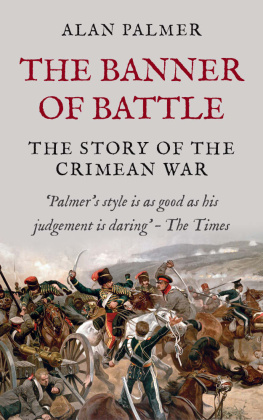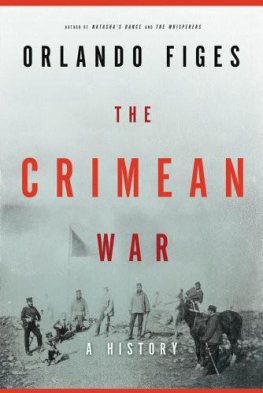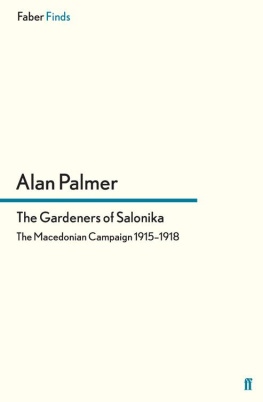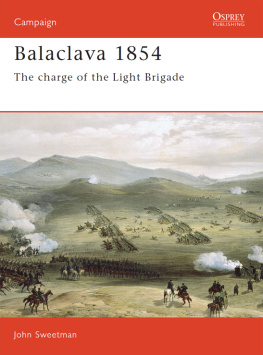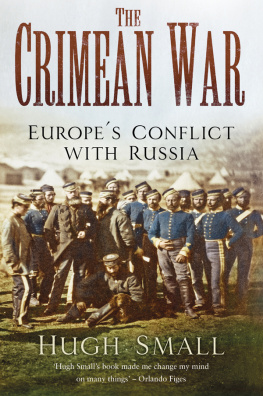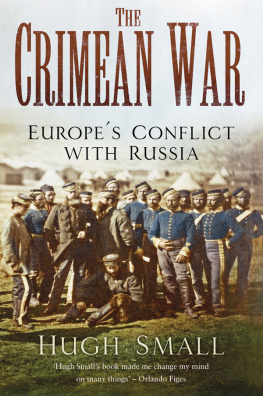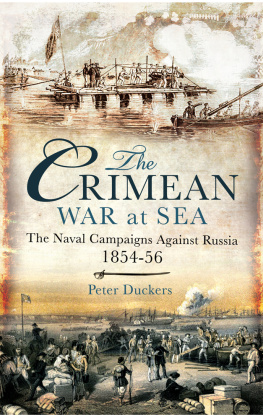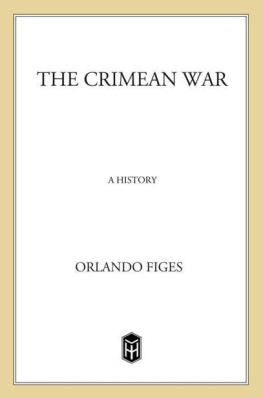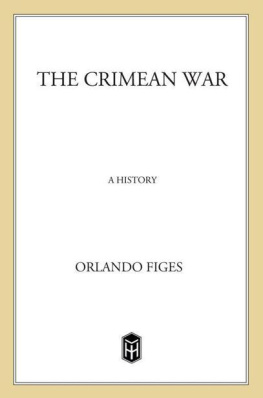The Banner of Battle
The Story of the Crimean War
Alan Palmer
Copyright Alan Palmer 1987
The right of Alan Palmer to be identified as the author of this work has been asserted by him in accordance with the Copyright, Designs and Patents Act, 1988.
First published in the United Kingdom in 1987 by George Weidenfeld & Nicolson Limited.
This edition published in 2015 by Endeavour Press Ltd.
Table of Contents
...So I wake to the higher aims
Of a land that has lost for a little her lust of gold,
And love of a peace that was full of wrongs and shames,
Horrible, hateful, monstrous, not to be told;
And hail once more to the banner of battle unrolld!
Tho many a light shall darken, and many shall weep
For those that are crushd in the clashing of jarring claims,
Yet Gods just wrath shall be wreakd on a giant liar;
And many a darkness into the light shall leap,
And shine in the sudden making of splendid names,
And noble thought be freer under the sun,
And the heart of a people beat with one desire:
For the peace, that I deemd no peace, is over and done,
And now by the side of the Black and the Baltic deep,
And deathful-grinning mouths of the fortress, flames
The blood-red blossom of war with a heart of fire.
from Alfred Tennyson, Maud (written in the spring of 1854)
Preface
During the hundred years which separate the first abdication of Napoleon from the battles of Tannenberg and the Marne there were, in all, fifteen wars between the nations of Europe, great or small. Their average length, however, was no more than eight months. One contest alone dragged on so long that its memorials record dates from four calendar years: this was the struggle which began when Turkish troops attacked Russian outposts in October 1853 and continued until the Great Powers signed a general treaty of peace at Paris in March 1856, twenty-nine months later. As most of the fighting took place on the western littoral of a peninsula remote from familiar battle zones, the conflict soon became known in Britain, France and Italy as the Crimean War. So, too, it has been remembered in the Soviet Union since Stalins day. But in Tsarist times Russian writers, conscious always of the risk of invasion from the West, called it the Eastern War ( Vostochnaia Voina ). This difference of nomenclature throws an interesting light on strategic geographical thought both in St Petersburg and in the Western European capitals at the height of the nineteenth century.
The Crimean War has a general interest today on three counts. It remains the only occasion in history when British troops fought against the regular organized army of a Russian state, Tsarist or Soviet. It was the first war fully covered by the Press, with graphic reporting and illustrated magazines bringing to the public at home a horrible awareness of active campaigning and exposing the ineptitudes of an archaic military system. And, while participants on both sides were drawing on muddled recollections from a Napoleonic past, it became a war that anticipated the future: warships were damaged by a minefield; battle orders settled at great distance before being flashed thousands of miles by electric telegraph; and there were plans for threatening Russias capital city with chemical warfare, for aerial reconnaissance by balloon, for a submarine, even for a locomotive land battery, a proto-tank. Historically, the Crimean War poses questions of wider interest still. Old friendships between veteran diplomats made a conflict seem improbable when, at Christmas in 1852, Lord Aberdeen became prime minister: why, then, did war follow within fifteen months? Once the fighting began it was assumed, both in London and in Paris, that Russia would be threatened on a northern front as well as around the Black Sea: why, then, was the clash of armies contained within so small an arena of battle?
The key to both answers lies in the inner politics and diplomacy of the Great Powers of Europe at mid-century. It might indeed be argued that the Crimean War has its greatest significance as a turning point in international relations. The Banner of Battle therefore seeks to place the conflict of 1853-6 in the general context of nineteenth-century history. The war is seen, not simply as a dramatic moment in the Eastern Question, but as a decisive campaign which lowered the stature of both defeated Russia and non-belligerent Austria as Great Powers, thereby changing the European balance between nations in the second half of the century. The title, chosen from some of the best-known stanzas of Tennysons Maud , has a double purpose. It recalls the last occasion upon which British troops marched into battle against a Great Power with colours flying and regimental bands playing; but it also emphasizes the strange mood of imperceptive patriotic pride with which the Poet Laureate, like so many of his countrymen, welcomed the passing of forty years of peace. It is perhaps as an essay in the dangers of a fickle public opinion that this book has its principal contemporary relevance.
My debt to earlier authors will be clear to anyone glancing at the bibliography. I have found some different sources from the ones cited in those two invaluable books, Cecil Woodham-Smiths The Reason Why and Christopher Hibberts The Destruction of Lord Raglan , but there must inevitably be some overlapping of material. Among papers deposited in the British Library I found the diary of Sir Hamilton Seymour informative on his sick man of Europe conversations with Tsar Nicholas I, while the journals and letters of Sir Hugh Rose (Lord Strathnairn) threw an interesting light both on British diplomacy in the spring of 1853 and on the Crimean campaign itself, for, after serving in the embassy at Constantinople, General Rose became Britains commissioner attached to the French army at Varna and in front of Sebastopol. Brief extracts from the letters sent by Colonel Alexander Gordon to his father have been quoted in biographies of Lord Aberdeen by Lucille Iremonger and Meriel Chamberlain but, so far as I am aware, they have not appeared in any narrative of the Crimean War; I have made rather more use of them, for it is clear that they were the most important direct link between the Prime Minister and a serving officer during the critical months of the Crimean campaign. The publication of Mrs Duberlys edited journal before Christmas in 1855 was welcomed as an opportunity for readers to canter through the campaign while the war was still in progress and, more than twenty years ago, Mr E. E. P. Tisdall made use of her letters in his Mrs Duberlys Campaigns before they were catalogued by what was then the British Museum Library. I was pleased, however, to find additional material in the letters of both Fanny Duberly and her husband. Professor John Curtisss Russias Crimean War and Colonel Seatons The Crimean War : A Russian Chronicle have been valuable, not only in themselves, but as guides to printed Russian sources, all of which I was able to locate either in the Bodleian or British Libraries; and I would especially like to acknowledge that Dr Brison Goochs The New Bonapartist Generals in the Crimean War suggested French printed material which I had not hitherto encountered.
The Earl of Clarendon kindly gave me permission to quote from the papers of his ancestor, the fourth Earl. I am grateful to him and, for their help, to the staffs of the British Library, the Public Record Office at Kew, the London Library and the Bodleian. I also acknowledge Griselda Fox Mason for permission to quote from Sleigh Ride to Russia (published by Sessions of York in 1985) and John Murray Ltd. for permission to quote from The Fields of War by R. Temple Godman which they published in 1977. I would like also to thank Miss Candida Brazil for her patience in preparing the book for publication and in finding the illustrations. My wife, Veronica who once again assisted me at every stage and completed the index; I deeply appreciate her encouragement and consistent support.
Next page
